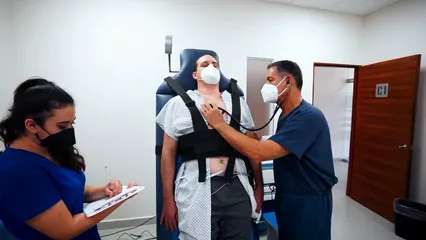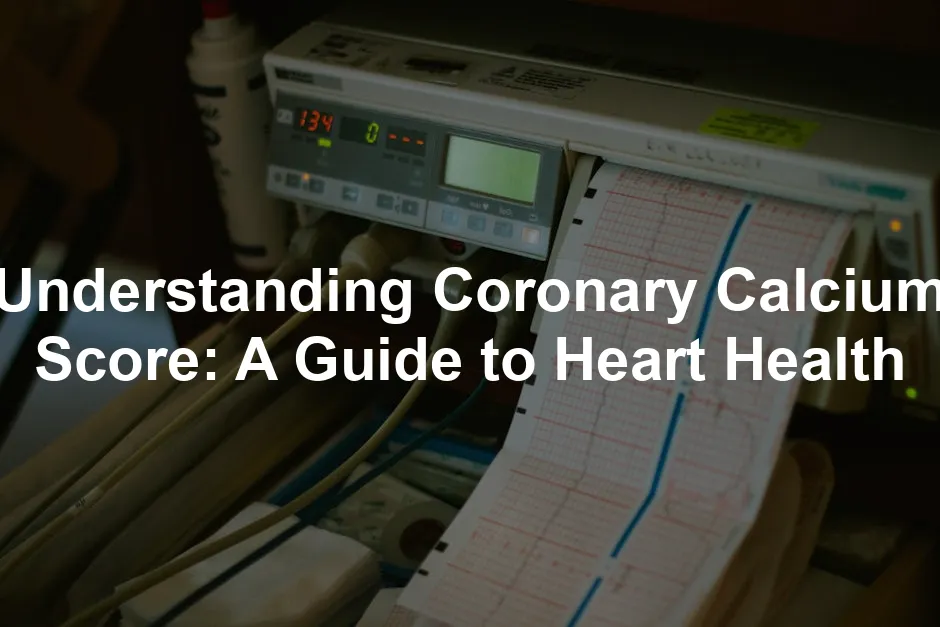What is a Coronary Calcium Score?
A coronary calcium score (CAC) is a test that measures calcium deposits in your coronary arteries. It helps assess your risk for coronary artery disease (CAD), a condition where plaque builds up in the arteries. This buildup can lead to heart attacks or other serious heart problems.
The score is derived from a specialized CT scan. During this scan, images of your heart are taken. The amount of calcium found is then quantified, resulting in a score. A higher score indicates a higher risk of heart disease.
Calcium serves as a critical marker in this context. Research suggests that individuals with elevated calcium scores often face a greater risk of heart-related issues. In fact, around 50% of individuals with high calcium scores experience significant cardiovascular events. This makes understanding your calcium score essential for proactive heart health management.
If you’re considering this test, it’s wise to consult your healthcare provider. They can help determine if the coronary calcium score is right for you based on your medical history and risk factors. Understanding your score can guide important lifestyle changes or treatment plans tailored to your heart health.

How Does a Coronary Calcium Scan Work?
A coronary calcium scan is a straightforward process. It uses a specialized CT scanner to take detailed images of your heart. This type of imaging technology allows doctors to see calcium deposits in the coronary arteries. These deposits can indicate plaque buildup and potential heart issues.
During the procedure, you lie flat on a table. Electrodes are attached to your chest to monitor your heart’s electrical activity. The scanner then moves around you, capturing images without any discomfort. No dye is necessary for this test, making it a non-invasive option.
The entire scan takes about 10 to 15 minutes. However, the actual imaging lasts only a few seconds. Results are typically available the same day, allowing for quick follow-up discussions with your doctor. If you’re curious about how this test could benefit you, consider scheduling a consultation to discuss the procedure in detail.

Why Should You Get a Calcium Score Test?
A calcium score test is recommended for specific groups. If you’re between 40 and 70 years old, especially with risk factors like high blood pressure or high cholesterol, this test can be valuable. It helps identify hidden risks for heart disease that might not show up in standard evaluations.
Knowing your calcium score can lead to important lifestyle changes. Studies show that individuals who modify their habits after testing can reduce their heart disease risk by up to 30%. This may include improving diet, increasing exercise, and possibly starting medications.
Understanding your calcium score empowers you to take charge of your cardiovascular health. If you have concerns about your heart health, assess your risk factors with a healthcare professional. They can guide you on whether this test is right for you.

Speaking of heart health, if you’re looking for delicious recipes to help lower cholesterol, check out the Heart-Healthy Cookbook: 150 Delicious Recipes to Lower Your Cholesterol. Eating healthy doesn’t have to be boring, and this cookbook proves it!
If you’re looking to understand more about the implications of the calcium score test, you can read our comprehensive guide on the calcium score test.
Interpreting Your Calcium Score Results
Understanding your calcium score results is vital for assessing heart health. The score ranges from 0 to over 1000, reflecting the amount of calcium found in your coronary arteries. Here’s a breakdown of what these scores mean:
- 0: No calcium detected. This suggests a low risk of coronary artery disease (CAD).
- 1-10: Minimal calcium. This indicates a slight risk of heart issues.
- 11-100: Mild calcium accumulation. This range suggests a moderate risk of CAD.
- 101-400: Moderate calcium levels, indicating a higher risk of heart disease.
- 401 and above: Extensive calcium indicates a significant risk of serious heart issues.
Research shows that about 50% of people with scores over 100 experience heart problems in the future. Regular monitoring of your calcium score is essential. It helps track changes in heart health over time and guides treatment decisions. Follow-ups with your doctor are crucial, especially if your score is elevated.
Discuss your results with your healthcare provider. They can explain the implications for your heart health and recommend appropriate actions based on your score, guiding you towards a healthier lifestyle. Understanding your Agatston score can empower you in your journey to better heart health.

To support your heart health, consider incorporating some heart-healthy snacks into your diet. A Heart-Healthy Snack Box Subscription can be a delightful way to ensure you always have nutritious options on hand!
Lifestyle Changes After a High Calcium Score
If you’ve received a high coronary calcium score, it’s time to make some impactful lifestyle changes. These adjustments can significantly reduce your heart disease risk and improve overall heart health.
Start with your diet. Focus on heart-healthy foods. Incorporate fruits, vegetables, whole grains, and lean proteins. Limit saturated fats and cholesterol-rich foods. Research indicates that dietary changes can lower cholesterol levels and improve heart function. A balanced diet helps combat plaque buildup.
Next, regular exercise is essential. Aim for at least 150 minutes of moderate activity each week. Activities like brisk walking, cycling, or swimming can enhance cardiovascular fitness. Maintaining a healthy weight also plays a crucial role in heart health. Losing even a small amount of weight can lower blood pressure and cholesterol.
Don’t forget about stress management. Chronic stress can harm your heart. Try relaxation techniques such as yoga, meditation, or deep breathing. These methods can reduce stress levels and promote a healthier mindset. Speaking of yoga, investing in a quality Yoga Mat for Home Exercise can make your practice more enjoyable and effective!
Studies show that individuals who implement these lifestyle changes can lower their heart disease risk by up to 30%. If you need guidance, consider setting up a plan with a nutritionist or health coach. They can help tailor your approach to your unique needs. Taking proactive steps today can pave the way for a healthier tomorrow.

To boost your fitness journey, why not try some Adjustable Dumbbells for Strength Training? They’re perfect for home workouts and can make a significant difference in your fitness routine!
Conclusion
Understanding your coronary calcium score is crucial for heart health. This test helps identify calcium buildup in your arteries, signaling potential risks for coronary artery disease. Early detection allows for timely intervention. Proactive health management can significantly reduce heart disease risk.
Regular testing empowers you to take control of your heart health. It’s an essential tool in preventing serious cardiovascular events. Consult with your healthcare professional to better understand your heart health and the role of calcium scoring in your overall health strategy.
Take charge of your well-being today and prioritize heart health! And don’t forget to stay hydrated with a Smart Water Bottle with Hydration Reminders to keep your body in tip-top shape!

FAQs
What is a coronary calcium score?
A coronary calcium score measures calcium deposits in your coronary arteries. It indicates your risk for coronary artery disease (CAD), helping assess heart health.
Who should have a coronary calcium scan?
Individuals aged 40 to 70 with risk factors like high cholesterol or hypertension should consider this test. It helps identify hidden heart disease risks.
What do the scores mean?
Scores range from 0 to over 1000. A score of 0 means no calcium, indicating low risk. Higher scores suggest increasing risk for heart disease.
Are there any risks involved with the scan?
The scan involves low radiation exposure, similar to a mammogram. Discuss any concerns with your healthcare provider before the test.
What lifestyle changes can help lower my calcium score?
To improve heart health, focus on a balanced diet, regular exercise, and stress management. These changes can help lower cholesterol and reduce plaque buildup.
Is a calcium score test covered by insurance?
Coverage varies by insurer. Some may not cover the test, so check with your provider about costs and your specific plan.
How often should I get a calcium score test?
The frequency depends on individual risk factors. Consult your healthcare provider to establish a testing schedule that suits your health needs.
Please let us know what you think about our content by leaving a comment down below!
Thank you for reading till here 🙂
All images from Pexels




